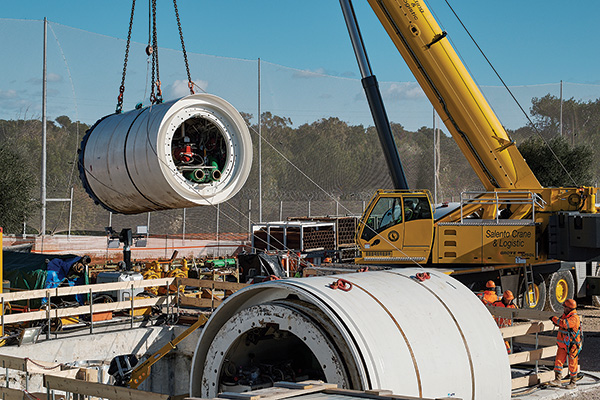Croatia Secures $566 Million to Construct Four New Gas Pipelines
(P&GJ) — Croatia's energy infrastructure is set for a significant upgrade with the signing of a contract worth 533.08 million euros ($566.4 million) to construct four gas pipelines by mid-2026, as reported by Poslovni Dnevnik. This initiative, known as the "Strengthening of Gas Infrastructure" project, aims to bolster natural gas transportation capacity from the LNG terminal on Krk.
The construction of these pipelines is expected to significantly increase gas transportation capacity to Slovenia and Hungary, according to Poslovni Dnevnik. Plinacro anticipates transporting 1.5 billion cubic meters (Bcm) of gas annually to Slovenia and 3.4 Bcm to Hungary, compared to current capacities of 260 million and 1.7 billion cubic meters, respectively. The total length of the four pipelines will span 220 kilometers (137 miles), with completion targeted by mid-2026.
The project will see the construction of four pipelines: Zlobin - Bosiljevo, Bosiljevo - Sisak, Kozarac - Sisak, and Zabok - Lučko. These pipelines will facilitate gas transportation from the Krk LNG terminal to Slovenia, Hungary, and other Southeast European countries.
All pipelines will feature bidirectional gas flow capabilities and integration into Plinacro's gas transport network management system.
Ministry head Damir Habijan told Poslovni Dnevnik that the signing of the contract is of “great importance” in advancing Croatia's energy transition and overall system transformation, particularly in light of heightened concerns over natural gas supply security following Russian aggression against Ukraine.
The project, funded through the NPOO as part of the REpowerEU plan, aims to enhance energy independence and supply source diversification for the EU.
Plinacro's board president, Ivica Arar, expressed gratitude for government support in securing grants for the project, noting that the investment will not impact gas transportation tariffs, according to Poslovni Dnevnik. Arar also highlighted the project's role in reducing reliance on Russian gas and enhancing supply security for Croatia and neighboring nations.
The contract, signed by the Ministry of Economy and Sustainable Development, the Fund for Environmental Protection and Energy Efficiency, and Plinacro, is part of the National Recovery and Resilience Plan 2021-2026.
Additionally, Director of the Fund for Environmental Protection and Energy Efficiency, Luka Balen, underscored the project's broader significance, emphasizing its potential role in future hydrogen transport infrastructure, Poslovni Dnevnik reported.
Related News
Related News

- Keystone Oil Pipeline Resumes Operations After Temporary Shutdown
- Freeport LNG Plant Runs Near Zero Consumption for Fifth Day
- Biden Administration Buys Oil for Emergency Reserve Above Target Price
- Mexico Seizes Air Liquide's Hydrogen Plant at Pemex Refinery
- Enbridge to Invest $500 Million in Pipeline Assets, Including Expansion of 850-Mile Gray Oak Pipeline





Comments